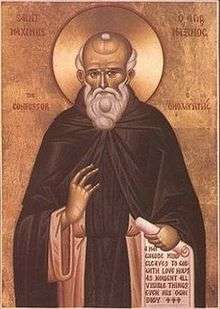December 25 (Eastern Orthodox liturgics)
December 24 - Eastern Orthodox liturgical calendar - December 26
All fixed commemorations below are observed on January 7 by Eastern Orthodox Churches on Old Calendar.[note 1]
For December 25th, Orthodox Churches on the Old Calendar commemorate the Saints listed on December 12.
Feasts
- The Nativity, according to the Flesh of our Lord, God and Savior Jesus Christ:[1][2][3][note 2][note 3][note 4]
- The Adoration of the Magi:[2][7][8]
- Commemoration of the shepherds in Bethlehem who were watching their flocks and came to see the Lord:[2][9][10]
- Annunciation to the shepherds; and Adoration of the shepherds.
Pre-Schism Western saints
- Saint Eugenia of Rome (c. 258)[11][note 5] (see also December 24 - East )
- Saint Anastasia of Sirmium (c. 304)[11][note 6] (see also December 22 - East )
- Saint Adalsindis, a nun at Hamay-les-Marchiennes Abbey, near Arras in France (c. 715)[11][note 7]
- Saint Æthelburh of Wilton (Alburgh, Alburga), a member of the royal house of Wessex, Abbess of Wilton Abbey and a saint (810)[11][note 8]
Post-Schism Orthodox saints
- Massacre of Monk-martyr Jonah,[note 9] and with him 50 monks and 65 laymen, martyrs at St. Tryphon of Pechenga Monastery, by the Swedes (1589)[2][12][note 10] (see also: December 15 )
New martyrs and confessors
- New Hieromartyr Michael, Priest (1930)[13]
Icon gallery
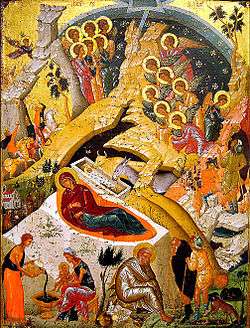 Byzantine icon of Nativity of Christ.
Byzantine icon of Nativity of Christ.
(Byzantine & Christian Museum, Athens).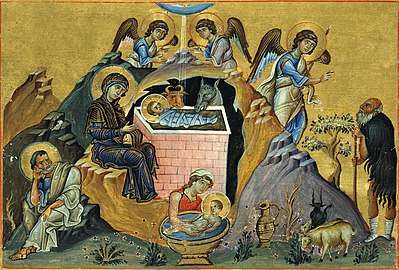
.jpg) The Nativity.
The Nativity.
(c. 1475)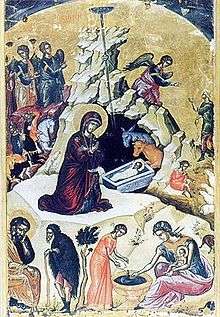 The Nativity.
The Nativity.
(16th century)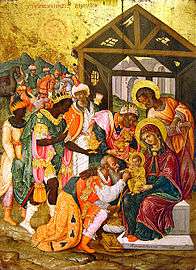 The Adoration of the Magi.
The Adoration of the Magi.
(Byzantine & Christian Museum, Athens)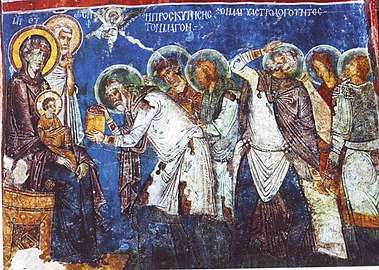 The Adoration of the Magi.
The Adoration of the Magi.
(Fresco in Cappadocia, 12th century)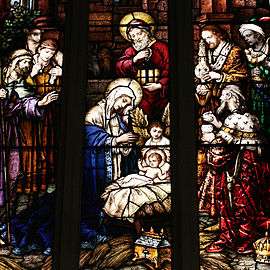 The Adoration of the Magi.
The Adoration of the Magi.
(Stained glass window in St. Michael Cathedral, Toronto, 1912).jpg) The Three Wise Men", Balthasar, Melchior, and Gaspar.
The Three Wise Men", Balthasar, Melchior, and Gaspar.
(Basilica of Sant'Apollinare Nuovo in Ravenna, Italy, c. 526 AD)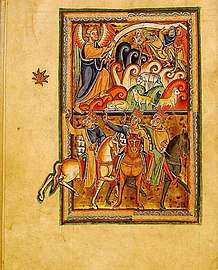
- Adoration of the shepherds.
(Vilar de Frades Church, Barcelos, Portugal)
Notes
- The notation Old Style or (OS) is sometimes used to indicate a date in the Julian Calendar (which is used by churches on the "Old Calendar").
The notation New Style or (NS), indicates a date in the Revised Julian calendar (which is used by churches on the "New Calendar"). - The traditional Orthodox greeting, used from today until the Eve of Theophany, is: "Christ is Born!" And the response is, "Glorify Him!"[4]
- "IN the year, from the creation of the world, when in the beginning God created heaven and earth, five, thousand, one hundred and ninety-nine (5199 BC); from the flood, two thousand, nine hundred and fiftyseven (2957 BC); from the birth of Abraham, two thousand and fifteen (2015 BC); from Moses and the coming of the Israelites out of Egypt, one thousand, five hundred and ten (1510 BC); from the anointing of King David, one thousand and thirty-two (1032 BC); in the sixty-fifth week, according to the prophecy of Daniel; in the one hundred and ninety-fourth Olympiad; in the year seven hundred and fifty-two from the founding of the city of Rome (752 BC); in the forty-second year of the empire of Octavian Augustus, when the whole earth was at peace, in the sixth age of the world, Jesus Christ, eternal God, and Son of the eternal Father, desirous to sanctify the world by His most merciful coming, having been conceived of the Holy Ghost, and nine months having elapsed since his conception, is born in Bethlehem of Juda, having become man of the Virgin Mary. THE NATIVITY OF OUR LORD JESUS CHRIST, ACCORDING TO THE FLESH."[5]
- "[Roman and all Western Martyrologies. Also the Eastern Menaeas. The Carthaginian Kalendar of the 5th cent., and the ancient Roman Kalendar of the middle of the 4th cent., published by Bucherius.]"
- "TILL the year 325 we have only uncertain traces of the observance of this festival; but in the middle of the fourth century, under Pope Liberius, we hear of it as generally observed in the Roman Church, and throughout the West. The celebration of the Feast of the Nativity spread from the West to the East, and S. John Chrysostom used his utmost endeavour to promote this introduction. Already, in 386, S. John Chrysostom says that the festival was observed in Antioch. The festival is ordered to be observed with reverence and dignity by the councils of Agde in 504 (can. 64), of Orleans in 511 (can. 24), and of Epaone in 517 (can. 35). Before this, the commemoration of the Nativity was united with that of the Epiphany, which is far the more ancient festival of the two... ... ...On December 25th the Greeks also commemorate the Adoration of the Magi."[6]
- A virgin-martyr in Rome under Valerian, she was buried in the cemetery of Apronian on the Via Latina.
- According to her Life, she suffered in Sirmium in Dalmatia, her relics were taken to Constantinople and veneration spread to Rome, where a basilica is dedicated to her.
- One of the daughters of Sts Adalbald and Rictrudis, she became a nun at Hamay-les-Marchiennes Abbey near Arras in France under her own sister St Eusebia.
- Sister of St Egbert of Wessex in England and wife of Wulstan of Wiltshire, she founded a convent in Wilton near Salisbury, where she became a nun in her widowhood.
- See: (in Russian) Иона Печенгский. Википедии. (Russian Wikipedia).
- This raid was carried out by a Finnish peasant chief named Pekka Antinpoika Vesainen, on December 25, 1589, and was part of the Russo-Swedish War (1590–1595).
gollark: (@sinth)
gollark: Also, plugging other behaviors/habits into the very glitchy and problematic fear system seems like a bad idea.
gollark: Well, I can infer from this and other stuff that you... fear some sort of mind-controlling and/or -reading monster.
gollark: I'll add it to your psychological profile
gollark: Fascinating.
References
- Great Synaxaristes: (in Greek): Η ΓΕΝΝΗΣΙΣ ΤΟΥ ΚΥΡΙΟΥ ΗΜΩΝ ΙΗΣΟΥ ΧΡΙΣΤΟΥ. 25 Δεκεμβρίου. ΜΕΓΑΣ ΣΥΝΑΞΑΡΙΣΤΗΣ.
- December 25/January 7. Orthodox Calendar (PRAVOSLAVIE.RU).
- The Nativity of our Lord God and Savior Jesus Christ. OCA - Feasts and Saints.
- The Autonomous Orthodox Metropolia of Western Europe and the Americas (ROCOR). St. Hilarion Calendar of Saints for the year of our Lord 2004. St. Hilarion Press (Austin, TX). p.2.
- The Roman Martyrology. Transl. by the Archbishop of Baltimore. Last Edition, According to the Copy Printed at Rome in 1914. Revised Edition, with the Imprimatur of His Eminence Cardinal Gibbons. Baltimore: John Murphy Company, 1916. pp.395-396.
- Rev. Sabine Baring-Gould (M.A.). "THE NATIVITY OF OUR LORD." In: The Lives of the Saints. Volume the Fifteenth: December. London: John C. Nimmo, 1898. pp. 276-277.
- Great Synaxaristes: (in Greek): Ἡ Προσκύνησις τῶν Μάγων. 25 Δεκεμβρίου. ΜΕΓΑΣ ΣΥΝΑΞΑΡΙΣΤΗΣ.
- The Adoration of the Magi. OCA - Feasts and Saints.
- Great Synaxaristes: (in Greek): Μνήμη τῶν Ποιμένων, ποὺ εἶδαν τὸν Κύριο Ἰησοῦ Χριστὸ. 25 Δεκεμβρίου. ΜΕΓΑΣ ΣΥΝΑΞΑΡΙΣΤΗΣ.
- Commemoration of the Shepherds in Bethlehem who were watching their flocks, and went to see the Lord. OCA - Feasts and Saints.
- December 25. Latin Saints of the Orthodox Patriarchate of Rome.
- Monkmartyr Jonah and with him 50 Monks and 65 Laymen at St Tryphon of Pechenga Monastery, by the Swedes. OCA - Feasts and Saints.
- January 7 / December 25. HOLY TRINITY RUSSIAN ORTHODOX CHURCH (A parish of the Patriarchate of Moscow).
Sources
- December 25/January 7. Orthodox Calendar (PRAVOSLAVIE.RU).
- January 7 / December 25. HOLY TRINITY RUSSIAN ORTHODOX CHURCH (A parish of the Patriarchate of Moscow).
- December 25. OCA - The Lives of the Saints.
- The Autonomous Orthodox Metropolia of Western Europe and the Americas (ROCOR). St. Hilarion Calendar of Saints for the year of our Lord 2004. St. Hilarion Press (Austin, TX). p. 2.
- December 25. Latin Saints of the Orthodox Patriarchate of Rome.
- The Roman Martyrology. Transl. by the Archbishop of Baltimore. Last Edition, According to the Copy Printed at Rome in 1914. Revised Edition, with the Imprimatur of His Eminence Cardinal Gibbons. Baltimore: John Murphy Company, 1916. pp. 395–397.
Greek Sources
- Great Synaxaristes: (in Greek) 25 ΔΕΚΕΜΒΡΙΟΥ. ΜΕΓΑΣ ΣΥΝΑΞΑΡΙΣΤΗΣ.
- (in Greek) Συναξαριστής. 25 Δεκεμβρίου. ECCLESIA.GR. (H ΕΚΚΛΗΣΙΑ ΤΗΣ ΕΛΛΑΔΟΣ).
Russian Sources
- (in Russian) 7 января (25 декабря). Православная Энциклопедия под редакцией Патриарха Московского и всея Руси Кирилла (электронная версия). (Orthodox Encyclopedia - Pravenc.ru).
- (in Russian) 25 декабря (ст.ст.) 7 января 2013 (нов. ст.). Русская Православная Церковь Отдел внешних церковных связей. (DECR).
This article is issued from Wikipedia. The text is licensed under Creative Commons - Attribution - Sharealike. Additional terms may apply for the media files.

